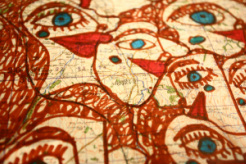|
Huub van Baar Professor of Politics, KU Leuven, Belgium Also affiliated with the Justus Liebig University Giessen, Germany, and with the University of Amsterdam, the Netherlands PhD Humanities (2011) - MA Philosophy (1998) - MSc Mathematics (1994) Fields of expertise Critical security studies, securitization theory, migration and border studies, security and development, 'race', ethnicity and racialization, governmentality studies, Romani studies The politics of migration, development, security and citizenship in Europe Post-1989 nationalism and minority politics in Central and Eastern Europe Socioeconomic and political position, history, culture, collective memory and transnational activism of Roma and Sinti minorities in Europe |
profile
I am a Professor of Politics at Leuven International and European Studies (LINES), at the Faculty of Social Science of KU Leuven, Belgium. My research focuses on the securitization of migration and on the position, protection and agency of vulnerable migrant and minority groups in Europe. At KU Leuven's campus in Kortrijk (KULAK), I teach about international and European politics. Together with Angéla Kóczé (Central European University, Budapest), I am the editor of the book series New Directions in Romani Studies, published by Berghahn in Oxford.
I am also a Senior Research Affiliate of the collaborative research center Dynamics of Security, which is based at the Justus Liebig University Giessen, the Philipps University Marburg and the Herder Institute for Historical Research on East Central Europe in Germany. At the Amsterdam Centre for Globalisation Studies (ACGS) at the Faculty of Humanities of the University of Amsterdam, the Netherlands, I am a Senior Research Fellow.
At the Institute of Political Science of the Justus Liebig University Giessen, and together with Regina Kreide, I coordinate and co-chair a long-term research project (2014-2025) on Roma minority formation and transformation in modern European history, entitled Between Minority Protection and Securitization: Roma Minority Formation in Modern European History. This 12-year project is part of the research program and collaborative research center Dynamics of Security: Forms of Securitization in Historical Perspective, funded by the German Research Foundation (DFG) and based at the Universities of Giessen and Marburg and the Herder Institute for Research on East Central Europe in Marburg.
I was trained as a mathematician and philosopher at the University of Amsterdam. After I worked several years as a freelance journalist for Dutch newspapers and magazines, I returned to the academy. In 2011, I finished my PhD project, titled The European Roma: Minority Representation, Memory and the Limits of Transnational Governmentality as part of the research project Globalization and the Transformation of Cultural Identities in East Central Europe. This project was funded by the Dutch Research Foundation (NWO) in its research program Transformations in Art and Culture (2003-2011).
After I finished my PhD project at the Amsterdam School for Cultural Analysis (ASCA), I first lectured for a short time at the Department of Philosophy and then became an Assistant Professor of European Studies at the University of Amsterdam (2012-14). I have taught BA, MA and research MA courses on European integration, on migration, minority, development, security and border policies of the European Union, on governmentality, biopolitics, power and agency in Foucauldian political philosophy, and on the histories, cultures, minorities and post-communist transitions of Central and Eastern Europe.
I am also a Senior Research Affiliate of the collaborative research center Dynamics of Security, which is based at the Justus Liebig University Giessen, the Philipps University Marburg and the Herder Institute for Historical Research on East Central Europe in Germany. At the Amsterdam Centre for Globalisation Studies (ACGS) at the Faculty of Humanities of the University of Amsterdam, the Netherlands, I am a Senior Research Fellow.
At the Institute of Political Science of the Justus Liebig University Giessen, and together with Regina Kreide, I coordinate and co-chair a long-term research project (2014-2025) on Roma minority formation and transformation in modern European history, entitled Between Minority Protection and Securitization: Roma Minority Formation in Modern European History. This 12-year project is part of the research program and collaborative research center Dynamics of Security: Forms of Securitization in Historical Perspective, funded by the German Research Foundation (DFG) and based at the Universities of Giessen and Marburg and the Herder Institute for Research on East Central Europe in Marburg.
I was trained as a mathematician and philosopher at the University of Amsterdam. After I worked several years as a freelance journalist for Dutch newspapers and magazines, I returned to the academy. In 2011, I finished my PhD project, titled The European Roma: Minority Representation, Memory and the Limits of Transnational Governmentality as part of the research project Globalization and the Transformation of Cultural Identities in East Central Europe. This project was funded by the Dutch Research Foundation (NWO) in its research program Transformations in Art and Culture (2003-2011).
After I finished my PhD project at the Amsterdam School for Cultural Analysis (ASCA), I first lectured for a short time at the Department of Philosophy and then became an Assistant Professor of European Studies at the University of Amsterdam (2012-14). I have taught BA, MA and research MA courses on European integration, on migration, minority, development, security and border policies of the European Union, on governmentality, biopolitics, power and agency in Foucauldian political philosophy, and on the histories, cultures, minorities and post-communist transitions of Central and Eastern Europe.
main research domains (currently under construction!)
|
- I
Roma minority and identity formation in modern European history Keywords: Europeanization of Roma representation; European minority and development policies; race, racism and racialization; liberal, illiberal, neoliberal and racial governmentalities; Romaphobia and anti-Gypsyism, new Roma-related historiographies In one of the key areas of my research, I focus on the formation and trans-formation of Romani identities in modern Europe history, from their first representation as a minority in the 18th century to their post-1989 represent-ation and self-representation as a European minority. In this research domain, I analyze the triangular relationship between Roma (identity, minority, etc.) representations, forms of minority governance, and the formation of knowledge and expertise. Through a historicization of this triangular relationship I try to shed light on the ways in which expertise, styles of governance and Roma representations and self-representations have historically co-constituted each other. Key publications (see publications for further details) in this domain: The Roma and Their Struggle for Identity in Contemporary Europe. Oxford: Berghahn, 2020 The European Roma: Minority Representation, Memory and the Limits of Transnational Governmentality Amsterdam: F&N, 2011 The Emergence of a Reasonable Anti-Gypsyism in Europe. In: When Stereotype meets Prejudice: Anti-Ziganism in European Societies, Timofey Agarin (ed.) Stuttgart: Ibidem Verlag, 2014, 27-44 image: Damian le Bas
image at the top of the page: Damian le Bas |
- - II
At the citizenship-security-develop-ment nexus in present-day Europe Keywords: securitization; de-securitization, security, development, border and citizenship regimes in Europe; evictability, post-socialist institutional developmentalism; race, racism and racialization, racial governmentalities In this research domain, I focus on the ways in which the Roma have become the target of Europe-wide programs of citizenship (rights, integration, inclusion etc.) and development (human security, empowerment, etc.), while they have also been considered as security problems (through practices of securitization). Some of the central questions are: - How do Roma in everyday life practices and in forms of activism try to challenge their securitization and to develop alternative forms of citizenship? - How do security and development experts in different settings and circles deal with Romani minorities and migrants? Key publications (see publications for further details) in this domain: The Securitization of the Roma in Europe. New York: Palgrave Macmillan, 2019 Contained mobility and the racialization of poverty in Europe: The Roma at the development-security nexus. In Social Identities, 2018 Evictability and the biopolitical bordering of Europe. In Antipode 49:1, 2017, 212-230 The Perpetual Mobile Machine of Forced Mobility: Europe’s Roma and the Institutionalization of Rootless-ness. In The Irregularization of Migration in Contemporary Europe Yolande Jansen et al. (eds), London: Rowman & Littlefield, 2015, 71-86 Europe’s Romaphobia: problematization, securitization, nomadization. In Environment and Planning D 29:2, 2011, 203-212 image: Delaine and Damian le Bas
|
- - - III
Enacting Minority Memory: Between governmentalization and citizenship Keywords: Holocaust remembrance and its governmentalization; changing European memoryscapes; enacting memory; globalization of Holocaust memories; conflicting memories; politics of memory; memory of politics; genocide In this area of investigation, I analyze how minority groups such as the Roma have developed various practices and narratives of memory to challenge prevailing articulations of history and memory in national and European contexts. I examine the diverse ways in which Roma have enacted memory as alternative practices of citizenship and how, on the other hand, European institutions have mobilized Holocaust remembrance and education as tools to deal with the integration of Roma in European institutional narratives and practices. Key publications (see publications for further details) in this domain: Enacting memory and the hard labor of identity formation: Rethinking the Romani movement and its historiography. In The Identity Dilemma: Social Movements and Collective Identity. Aidan McGarry & James Jasper (eds.) Philadelphia: Temple University Press, 2015, 150-69 Cultural policy and the government-alization of Holocaust remembrance in Europe. In International Journal of Cultural Policy 17:1, 2011, 1-17 The way out of amnesia? Europeanization and the recognition of the Roma’s past and present. In Third Text 22:3, 2008, 373-85 image: impression from the permanent exhibition of the Roma Holocaust in the Auschwitz museum in Poland (photo Huub van Baar)
|




